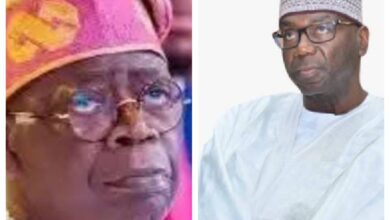Nigeria’s external loans and World Bank

The Finance Minister, Kemi Adeosun had stated at the meeting of the Bretton Woods institutions in the United States that the country is fit to borrow so long as the loan is tied to infratructure development. However, the World Bank has disagreed with the Minister of Finance stating that Nigeria was already saturated with loans.
Speaking in Abuja during the week, Senior Economist with the World Bank, Gloria Joseph-Raji, said that the cost of borrowing or paying interest on Nigeria’s debt was not sustainable as revenues to make such payment had dried up. Adeosun said on Sunday at a press briefing rounding off the World Bank/International Monetary Fund annual meeting in Washington that Nigerians would need to tolerate more borrowings going forward for government to deliver needed infrastructure.
But Joseph-Raji said that tapering revenues had raised a interest both at the Federal Government and the World Bank on sustainability of Nigeria’s borrowings as debt-to-revenue ratio had increased by 25 per cent within a period of one year. The advisor stated that in 2015, the country’s debt to revenue ratio stood at 35 per cent but rose to 60 per cent by 2016, reflecting a reduction in government revenues and rising debt profile, thereby raising a question about the debt sustainability.
Joseph-Raji said, “Nigeria has a decent debt-to-GDP ratio, currently about 19 per cent. It is the debt to revenue ratio that is of concern and that rate is a sustainable issue. That is of concern to us and that is also of concern to the government.
“The government is aware that the debt is looking more unsustainable from the point of debt service to revenue ratio. The estimate we had for last year at the federal level was about 60 per cent. That is coming from about 35 per cent in 2015.
“That reflects the substantially lower revenues that Nigeria recorded last year. Even among the state governments; we know that a lot of state governments are servicing a lot of debts from their federation account allocation. So, there is really going to be a sustainable issue emerging.”
The World Bank expert said she was concerned about the sustainability of the country’s debt, especially the huge domestic borrowing with high interest rate, which prompted the Debt Management Office to come up with a strategy to rebalance the country’s debt portfolio.
She said, “The DMO released the Debt Management Strategy 2016 to 2019 last year. The strategy was to rebalance the debt portfolio from more of domestic now to more of foreign. That is because of the debt servicing cost.
“Before now we had a debt portfolio of about 80 per cent domestic to 20 per cent external. We know that the debt servicing cost of domestic debt is really high. Treasury bill is an average of 18 per cent; the FGN bonds, from 16 per cent. The government is trying to rebalance its portfolio with foreign debt, which has much lower interest rate than domestic debt. That is why this year you have seen them go for Eurobonds, with a total of $1.5bn in the first quarter of the year. They also did Diaspora bond of $300m. If you look at the yield on those bonds, they are much less than 10 per cent. The government is aware that there is a sustainable issue and that is what they are trying to correct by taking more foreign debt.
“Several developing countries have adopted far-reaching domestic strategies to mitigate the effects of international market shocks and global financial crisis. While countries like Malaysia are increasing internal investments to develop their economies and make them as independent and vibrant as possible, rather than shrink deeper into global financial waters, Nigeria seems to be doing quite the opposite; preparing frameworks and opportunities for more foreign exchange and capital flight from the country in annual debt servicing.”
“External debts are cheaper to service especially when they come from multilateral sources. The attention of government has shifted to foreign debt. I am in support of government’s plan to borrow $3bn to refinance some local debts. What is important is that the National Assembly and other agencies should focus on is the monitoring of what we do with foreign loans. This is because foreign loans also have their own risks such as shock in exchange rates,” she said.
Surely where there is scarcity of revenue in a stressed economy, the country will have to borrow. But when it keeps going up, the ratio to debt widens, that automatically creates another financial burden. Like the minister said, most of our loans must be evidence based. Nigerians must see what those loans were used to acquire. This will help the masses monitor the progress on every procurement. The time to steal money gotten from loans is over.





